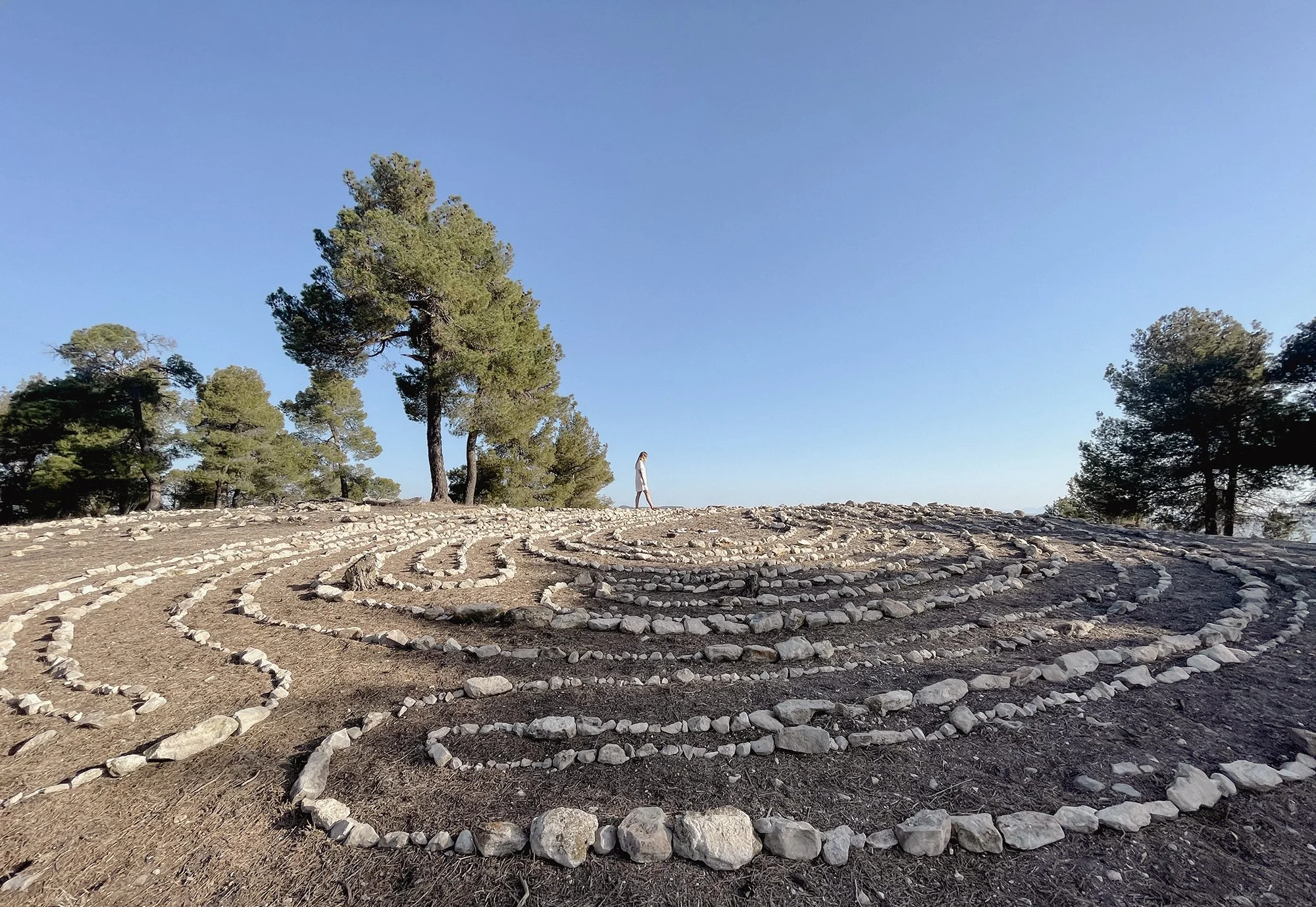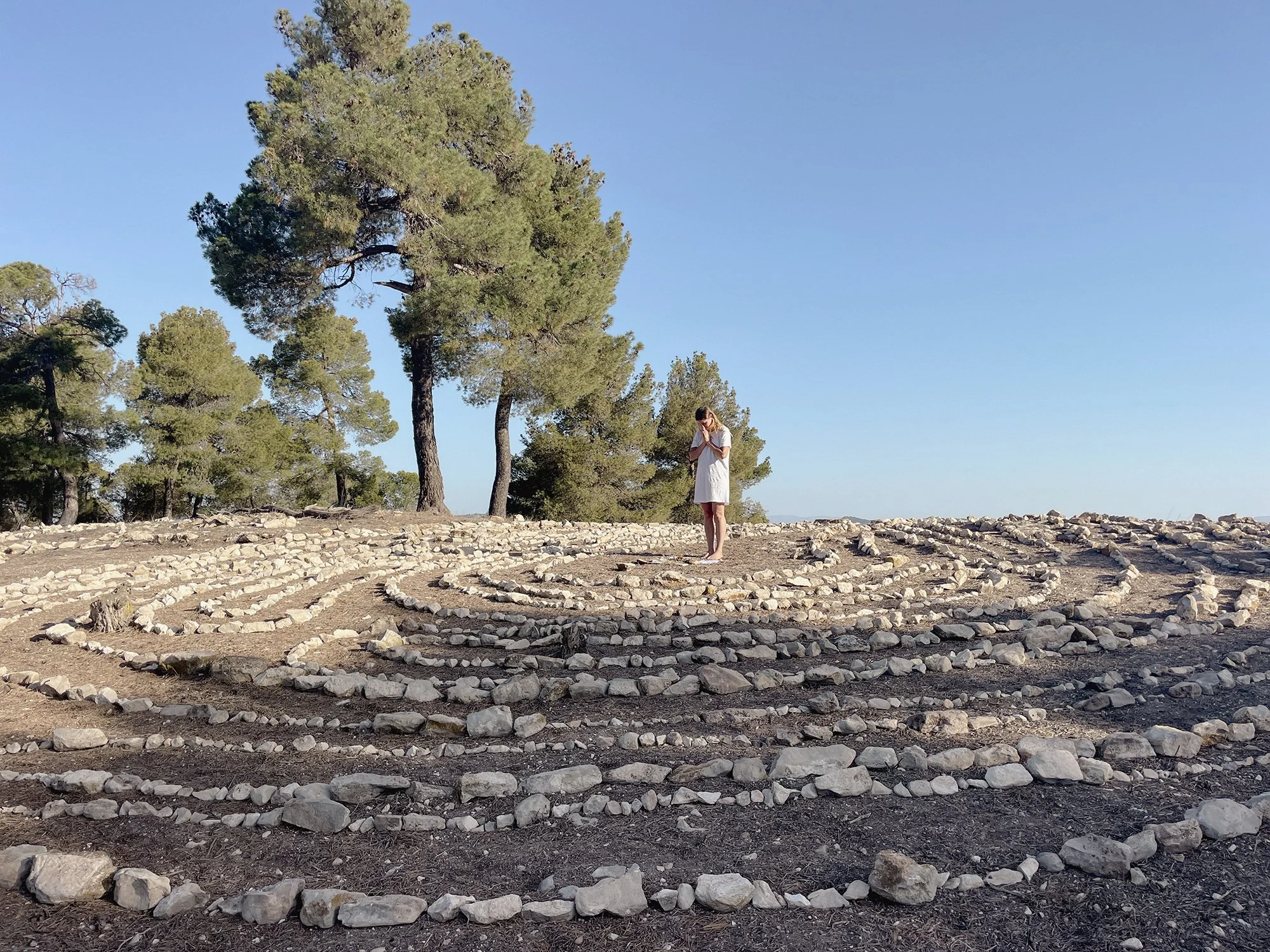
Joya: arte + ecología / AiR conceptualised SENDA as a response to the depopulation of rural areas in Spain, known as España Vacia, and the resulting environmental degradation.
This initiative aims to foster international community development by integrating art with the natural environment in this region of Spain. The art created can be permanent, ephemeral, or performative, with temporary and performance pieces recorded and archived in the SENDA database.
The vision of the project is to transform the area into a space where art and nature co-evolve, creating a modern space that merges culture with the natural environment.
SENDA is designed to serve as a cultural landmark, featuring artistic installations that engage with the local landscape, stimulating community interaction and cultural growth.
Sophie Anna Gibbings
The Labyrinth
Created by Sophie Anna Gibbings for Joya: AiR
April - May 2024
“The mind, when quieted and expanded beyond everyday consciousness opens a path to the sacred through the gift of the imagination. Images offered up through our creative imaginations can help us heal our hurt psyches and discover new capacities. We feel joy because we know the sacred act of healing is taking place” - Lauren Artress
The labyrinth is an archetype of oneness with each other and the surrounding landscape. Labyrinths bring about the personal and communal transformation that is essential for the ultimate preservation of life on this fragile Earth.
I have a longing for co-creation and seek a sense of oneness. I built this labyrinth with the intention to allow for my wandering soul to find a way to center, to find a way home. It has helped me move back out into the world, replenished, and directed. Trusting my own path in life.
I was searching for what home meant and felt like to me - an answer for which path to take. Overwhelmed with uncertainty, I began to make my own path. Creating the labyrinth helped me see my life in the context of a path and gave me a lot of peace. One stone after another, one foot after the other.
To seek answer to questions is to seek a sacred path. When we have lost our way, when we come to that realization, we discover the path once again. Losing our way in life is not only inevitable, but also an experience that is part of the spiritual path. As soon as we become conscious that we are lost, we have found our way again.
There is no one way to walk the labyrinth. I invite you to enter with an open mind and an open heart. The labyrinth can be a kind of guided meditation, your mind quieting as your body moves.
To walk a sacred path is to discover our inner sacred space: that core of feeling that is waiting to have life breathed back into it through symbols, archetypal forms like the labyrinth, through rituals, stories, and myths. Attuning to the invisible world opens us up to the experience of unity. Like planet Earth, the shape and modality of the labyrinth is circular.
Upon entering the labyrinth, we sense that it is a symbol representing the whole. Our divided world disappears as we enter a non-dualist one, where clear thinking through the channel of intuition has a chance to emerge from deep within. The circular path inward cleanses and quiets us, as it leads us in. The unwinding path outward integrates and empowers us to move back into the world.
If you feel called to add to the alter in the center, please do. This can be a poem, artwork, stone, or anything else collected in the landscape. This is a communal space for us all, human and non-human”.
Sophie Anna Gibbings
I would be grateful if you shared photos and/or reflections on your experience walking the labyrinth with me on Instagram or via email:
@sophieannagibbings / Regenerativecollaborations@gmail.com / #sophieslabyrinth
Sophie Anna Gibbings was born in Santa Barbara, California and has lived in the UK for the past 3 years. She received her Bachelor’s degree in photography from Lesley University College of Art and Design. She recently earned her Master’s in Art in Contemporary Photography: Practices and Philosophies at Central Saint Martins. She was awarded the University of The Arts, London Art for the Environment Residency (AER) at Domaine de Boisbuchet, France. Sophie was shortlisted for the University of The Arts, London Maison/0 This Earth Award. Most recent exhibitions include Art for the Environment at GroundWork Gallery, Norfolk, UK, Meant to Fade at Laneway Gallery, Cork, IE, Impermanent at Safehouse Gallery, London and a performance for Dance for the Sky at Slash Arts Gallery Houseboat, London.
directions from Joya: AiR
Simon Linington
Title: Bajo la Sierra Larga / Simon Linington
The Joya: SENDA inaugural work is by artist Simon Linington…
‘Bajo la Sierra Larga’ is a site-specific sculpture, and the first from the Souvenir series made to be presented outside.
The Souvenir series is an ongoing sculptural sequence that displays broken down materials in acrylic or glass vitrines. The materials for this sculpture have been taken from a nearby dry riverbed, and sorted by size, type and colour.
I grew up on the Isle of Wight, and as a child I would go to Alum Bay to fill glass bottles with coloured sands from the cliff face. Ever since, material and place have been inseparable.
Biography
Simon Linington is an artist dividing his time working between England, Spain and Mexico City. He has a BA (Hons) in Sculpture from Chelsea University of the Arts, London. In 2010 he was awarded the Emerging Artists Bursary Award by the Royal Society of Sculptors and exhibits internationally.
Notable solo exhibitions include More home ideas, Calle Tajin, Mexico City (2020), LA LA LAND, William Benington Gallery, London (2019), In from the light, Castor, London (2018), Everything is medicine, Lily Brooke, London (2017), Everything can be broken, Division of Labour, London (2017), Now Showing..., Manchester Contemporary (2015), Out of the Dark, Hayward Gallery, London (2015), Dirty Matters, Galleria Emma Thomas, São Paulo (2015).
Notable group exhibitions include From Cellar to Garret, South Parade, London (2021), Salon Acme 8, Mexico City (2020), Under the Volcano, Brooke Benington Residencies, Mexico City (2020), Habitual, Castor, London (2020), Prevent This Tragedy, DATEAGLE ART at Post_Institute, London (2018), Contemporary Sculpture Fulmer, William Benington Projects, (2017), Art Rotterdam with Division of Labour (2017), The London Art Fair with IMT Gallery (2017), Arco Madrid with Galleria Emma Thomas (2015).
Simon’s first solo publication LA LA LAND was published by William Benington Gallery, London, in 2019 and was released on the occasion of his first play, Simon Says.
“Art creates an intimacy between subject and object in ways that lead to profound, yet sometimes discomforting, connection. It is this connection that is crucial to our ability to find solutions to the climate crisis. Whilst the dominant discourses of climate change construct a clean and sterile narrative suggesting that the crisis can be addressed by some shiny new technology, and a bit of adaptation, those who paint, dance until the moon drops, pen ecstatic poems, capture dying suns, are best placed to create different stories. Art has the capacity to engage with the murk and mess of life and, importantly, its profound beauty too – art is a celebration, and criticism, of that which makes us human and it is an exploration of this humanness that is required if we are to heal our violent relationship with the more-than-human world. It is our profound disconnection from this world that is the cause of climate change and only art has the techniques and approaches to heal this disconnection and, in so doing, build our awareness of what we are doing to this beautiful planet.”
SENDA is an initiative from Joya: arte + ecología / AiR. This license allows reusers to copy and distribute the material in any medium or format in unadapted form only, for noncommercial purposes only, and only so long as attribution is given to the creator.
Credit must be given to the Joya: AiR and individual artists who’s work is featured within SENDA
Only noncommercial uses of the work are permitted.
No derivatives or adaptations of the work are permitted.








